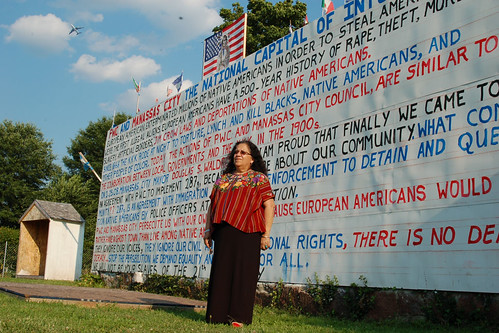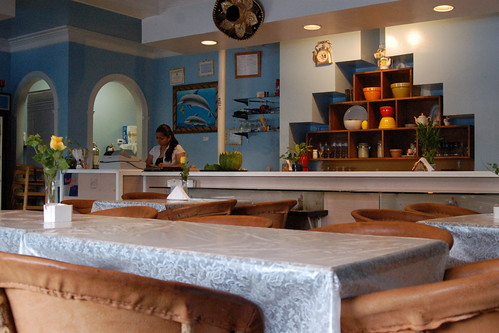Diego Graglia is documenting the lives of Latinos during this presidential election year as he travels from New York City to Mexico City. For more on La Ruta del Voto Latino-The Road to the Latino Vote visit www.newyorktomexico.com.
On our first day on the road we arrived in Manassas, Virginia, not far from Washington D.C. Our goal was to revisit the intense and controversial debate on immigration that has been taking place there.
A year ago the Prince William County supervisors launched a crackdown on undocumented immigrants. They passed a resolution whose outstanding feature allows local law enforcement to inquire about the immigration status of people they suspect of committing a crime or misdemeanor (even jaywalking.) Officers can also report undocumented immigrants to federal Immigration and Customs Enforcement for deportation processing.
Since then, the Latino population in the county appears to have plummeted.
As soon as we arrived, I met Teresita Jacinto, a spokeswoman for Mexicanos Sin Fronteras/Mexicans Without Borders. Listen here to a Podcast of my interview with Jacinto.
I interviewed her in front of what people in Manassas call The Wall — and those supporting immigrants regardless of their status call El Muro de la Calle Libertad (Liberty Street wall). It’s painted on the side of a burnt-down house by Mexican-born owner Gaudencio Fernández. In the wall’s strong message, he calls Prince William County, “the national capital of intolerance.” [Read the full text in this photo.] Unfortunately when we arrived Fernández was on vacation in Mexico.
The wall has been the subject of controversy and the target of attacks. As you’ll read in this story, Fernández has to go to court after his vacation. But I was more concerned with understanding its message.
Fernández underlined his and other Latin Americans’ indigenous heritage. He says “European Americans… were the first illegal aliens” and they “would rather have a ghost town than live among Native Americans.”
That, indeed, seems to have been the result.
Jacinto, who was born in a Texas homestead and is a Spanish-language grade school teacher, said the number of students who are children of immigrants decreased noticeably this year. In previous years the month of February signaled the arrival of some 600 new students. The students came with their parents who arrived to catch the increase in constructing jobs after the dead of winter. “This year, there were 650 fewer students,” Jacinto said. “They left.”
Some blocks in Manassas and other Prince William County communities look like “ghost towns,” she added. The foreclosure crisis only added to the number of empty houses.
The next day, as we had lunch at the empty La Antorcha Restaurante y Pupusería, I asked the lone employee, Beatriz Monge, a 21 year old Salvadoran, whether the place was always so quiet at lunch time.
Monge said the crackdown had seriously impacted business. “People sold their homes, their kids dropped out of school,” she said, “because (the police) could have taken them if they stayed.”
I wanted to talk to people with Help Save Manassas, the local group that had pushed strongly for the county resolution on immigration, but none of their officials responded to my emails while I was there. If they do during the trip, I’ll be sure to include their comments here. Still, HSM’s opinions are clear as water on their website and their newsletter, The Front Line. (Click here to open in pdf.)
“The unlawful presence of illegal aliens in our communities causes a significant number of problems,” the HSM website says. It adds undocumented immigrants are twenty percent of the local jail population, “distort the lower end of the labor market in ways that harm tradesmen and service employees, engage in rampant identity theft, and all too often contribute to residential overcrowding, increased demand on public services, and an overburdened health care system.”
Regarding the county resolution, HSM says it has helped decrease crime (a causal relationship that is disputed) and reports that over 700 people have been turned over to ICE. It also lists other benefits resulting from the crackdown.
I still wanted to hear someone who actively supports tougher immigration enforcement. The HSM site lists businesses which “do the right thing“, i.e. don’t hire workers without proper documentation. So we drove up to the first one on the list, Andrews Auto Body in the city of Manassas Park.

Ray Andrews: outside his body shop.
To my surprise (and his), Ray Andrews, 43, did not know what I was talking about when I introduced myself and mentioned the “Do the Right Thing” list. He faintly remembered meeting someone who may have been from HSM at a Fourth of July celebration and giving them his business card.
“I don’t remember signing up,” Andrews told me.
“I agree with some of that stuff,” he added in reference to HSM’s positions and made clear he doesn’t hire anyone without a work permit. “But I’m not against Spanish people or people of Mexican descent coming here. I’m against any illegal immigrant -no matter where they come from, it can be Mexico or it can be England- coming over here and getting all these (public) programs.”
Andrews is an Ohio-born Native American; he belongs to the Sault Ste. Marie tribe of Chippewa Indians. He told me a couple of stories that made me think of the point made by Gaudencio Fernández in his wall about many immigrants being Native Americans too.
The body shop owner said he’s mistaken for Hispanic quite often. “I get asked that all the time,” he said. “Do I speak Spanish?… If I’m legal…”
His wife Vicky -they have four boys and four girls- then chimed in to tell us about the time Ray lost his driver’s license and had to get a new one. “He had to bring four different ID’s to prove (he was an American citizen),” she said.
“They asked me for my green card,” Andrews added. Local police had pulled him over a couple of times, too, for no apparent reason.
Despite the big local controversy, Andrews said immigration was not a concern of his when thinking about his vote on the November election. There are bigger problems, he said: the war, the economy, gas prices in particular.
Quite a different view from Teresita Jacinto’s, as you can see on this video:
“There’s a lot of immigrants who are registered,” Jacinto added, “and youngsters who have not registered yet. We want to keep them interested so they go out and vote. But right now there’s not a lot of faith in the democratic system.”



